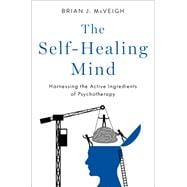
The Self-Healing Mind Harnessing the Active Ingredients of Psychotherapy
by McVeigh, Brian J.Buy New
Rent Textbook
Rent Digital
Used Textbook
We're Sorry
Sold Out
How Marketplace Works:
- This item is offered by an independent seller and not shipped from our warehouse
- Item details like edition and cover design may differ from our description; see seller's comments before ordering.
- Sellers much confirm and ship within two business days; otherwise, the order will be cancelled and refunded.
- Marketplace purchases cannot be returned to eCampus.com. Contact the seller directly for inquiries; if no response within two days, contact customer service.
- Additional shipping costs apply to Marketplace purchases. Review shipping costs at checkout.
Summary
In The Self-Healing Mind, mental health counsellor and anthropologist Brian J. McVeigh postulates that around 1000 BCE, population expansion and social complexity forced people to learn "conscious interiority"--a package of cognitive capabilities that culturally upgraded mentality. He argues that
the mental processes that help us get through the day are the same ones that can heal our psyches. Adopting a common factors and positive psychology perspective, McVeigh enumerates and defines these active ingredients of the self-healing mind: mental space, introception, self-observing and observed,
self-narratization, excerption, consilience, concentration, suppression, self-authorization, self-autonomy, and self-reflexivity. McVeigh shows how these capabilities underlie the effectiveness of psychotherapeutic techniques and interventions. Though meta-framing effects of psyche's recuperative
properties correct distorted cognition and grant us remarkable adaptive abilities, they sometimes spiral out of control, resulting in runaway consciousness and certain mental disorders. This book also addresses how maladaptive processes snowball and come to need restraint themselves.
With insights from counseling, psychotherapy, anthropology, and history, The Self-Healing Mind will appeal to practitioners, researchers, and anyone interested in neurocultural plasticity and how therapeutically-directed consciousness repairs the mind.
Author Biography
Brian J. McVeigh received masters degrees in anthropology and counseling. He is a licensed mental health counselor in private practice and a scholar of Japan and China where he lived and taught for 16 years. For ten years he taught in the Department of East Asian Studies at the University of
Arizona. The author of 16 books, he has an interest in how humans adapt, both through history and therapeutically. His current projects include The Psychology of Ancient Egypt: Reconstructing a Lost Mentality.
Table of Contents
Preface
Acknowledgments
Abbreviations
Notes to reader
Prologue: Searching for the Active Ingredients of the Self-Healing Mind
PART 1: The Adaptive Mind, Consciousness, and Implications for Therapy
Chapter 1: Purposes and Premises: The Therapeutic Properties of Subjectivity
Chapter 2: What is Consciousness? Clarifying the Stuff of Mind
PART 2: The Benefits and Costs of Conscious Interiority
Chapter 3: The Advantages of Conscious Interiority
Chapter 4: Runaway Consciousness: The Price of Scaled-up Cognition
Chapter 5: A Brief History of the Interiorization of Psychotherapy
PART 3: The Meaning of Mental Health and How the Psyche Adjusts
Chapter 6: Treating Mental Illness and Facilitating Mental Wellbeing
Chapter 7: The Nature of Self: Systemized, Serialized, Dramatized
Chapter 8: The Self-Organizing Mind: Rhythms, Routines, Rituals
PART 4: Applications, Approaches, and Interventions
Chapter 9: Using Conscious Interiority as a Therapeutic Tool
Chapter 10: Key Therapeutic Skills and Conscious Interiority
Chapter 11: Groups and Families as Therapeutic Systems
Chapter 12: Emotions and Conscious Interiority
Chapter 13: Hypnosis and Meditation: Suspending and Modulating Conscious Interiority
Chapter 14: Human Diversity, Social Adaptation, and Psychotherapy
Epilogue: Final Thoughts
Appendices
A: Synopsis of Positive Psychology
B: Synopsis of Common Factors
C: The Historical Birth of Conscious Interiority
D: What Conscious Interiority is Not
E: Psyche-Biological Hardware or Cultural Software?
F: Examples of Metaphoric Creativity
G: Five Perspectives on Conscious Interiority: A Summary
H: Developmental Stages of the Lifespan and FOCI
Glossary: A Jaynesian Therapeutic Perspective on Techniques and Interventions
References
Index
About the author
An electronic version of this book is available through VitalSource.
This book is viewable on PC, Mac, iPhone, iPad, iPod Touch, and most smartphones.
By purchasing, you will be able to view this book online, as well as download it, for the chosen number of days.
Digital License
You are licensing a digital product for a set duration. Durations are set forth in the product description, with "Lifetime" typically meaning five (5) years of online access and permanent download to a supported device. All licenses are non-transferable.
More details can be found here.
A downloadable version of this book is available through the eCampus Reader or compatible Adobe readers.
Applications are available on iOS, Android, PC, Mac, and Windows Mobile platforms.
Please view the compatibility matrix prior to purchase.
